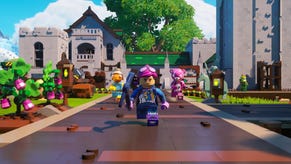Saying Hello to Hello
The MD of indie outfit Hello Games, Sean Murray, talks about the experience of starting out from scratch
No, not yet. We've been through pretty much everything a new studio can go through - what we did when we started was to have this plan of "We build it, they will come." As I said, we don't have a business manager, so we just concentrated on making something, and then... let's see.
Then you get to a point where you realise you don't have any dev kits, and we don't really just want to be PC-based - we've always been console developers - and also I think those are the markets that are really interesting to us.
And as well as that, as a new studio we can't put ourselves into a corner - every publisher you meet, every platform holder... it's almost Catch-22, they want to see it on a console of some kind.
So then we started working on that, building up our list of contacts, and it takes a really long time to get dev kits in, to start talking to publishers and platform holders. We approached it in such a way that we weren't going to rule anything out, like working with publishers and be indie through and through, because we weren't sure how that business model works.
So we made our game and hopefully we're talking to the right people now to be able to announce what platform we're on in the future.
Well, for us the main thing is the gameplay, but as well as that I think the game that we're making does have high production values and we don't think our game is more worthy because it was only made by four people - hopefully it will have a personality that other games don't have, but we feel we have to compete, that's not an excuse.
We're making the best game we possibly can - but I think you're right, as a developer it is a shame that, while I don't think the door is closing on those platforms, it is getting a lot harder to open, and there are a lot of people saying that.
That's just economics in some ways - it is a closed market. There are only a certain amount of slots, and they're maintaining those to hopefully increase quality for the consumer. The only thing that is a shame in that is that more traditional titles will end up being non-XBLA.
I think at retail, if you look at the keynotes from E3, the majority of announcements were sequels, definitely. That puts games as more of a form of software, almost, where it's just different versions, and improving versions, rather than something that's full of new ideas.
I think having said that, you look at some platforms like the Nintendo DS, and it has the widest, weirdest range of titles on there. You can play anything on a DS, and there are so many different genres.
Yeah, with a more open market that certainly happens. I think the iPhone is a good example of that, where it's just the widest open door on the market. That means you'll have niches catered for, which is great, but it also means that your title might be lost, and you might have your amazing new Sudoko game come out on the same day as three others.
That is a difficult business to be in - it's the sheer volume of titles. As a consumer, that can be great, but it can also be terrible, because you look on there and sometimes the quality isn't there, or it's a confusing platform to find a game that you want. Knowing that you're going to be one of those many people makes it a difficult platform to start out developing for.
Then you've got the opposite side of things, like XBLA which is generally two slots a week, around a hundred games per year. It's a known quantity, and it's managed, but it also means it's going to get harder as the market grows - that means there's a loss, that some of the riskier ideas and projects aren't going to be on that service.
Sean Murray is MD of Hello Games. Interview by Phil Elliott.


.jpeg?width=291&height=164&fit=crop&quality=80&format=jpg&auto=webp)


.jpg?width=291&height=164&fit=crop&quality=80&format=jpg&auto=webp)


